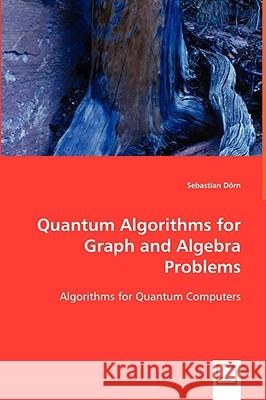Quantum Algorithms for Graph and Algebra Problems » książka
Quantum Algorithms for Graph and Algebra Problems
ISBN-13: 9783639057980 / Angielski / Miękka / 2008 / 220 str.
Quantum computing is an exciting new area between computer science and quantum physics. The computation is based on quantum mechanics. Quantum computing has the potential to demonstrate that for some problems quantum computation is more efficient than classical computation. Sebastian Dorn presents new quantum algorithms for basic problems from graph and algebra theory. First of all, he introduces several quantum search procedures, like Grover search and quantum walks. Then he presents an overview of recent quantum graph algorithms, for example shortest path and maximum flow algorithms. In the main part of this book, Sebastian Dorn gives new quantum algorithms for matching problems, graph traversal problems and independent set problems. Furthermore quantum complexity bounds for group testing problems and for problems from linear algebra are presented. All quantum algorithms are faster than the best known classical algorithms for the corresponding problems. This book will be of interest to graduate students and researchers in physics, computer science and mathematics with an interest in quantum computing, and may be used in courses on quantum algorithms."
Quantum computing is an exciting new area between computer science and quantum physics. The computation is based on quantum mechanics. Quantum computing has the potential to demonstrate that for some problems quantum computation is more efficient than classical computation. Sebastian Dörn presents new quantum algorithms for basic problems from graph and algebra theory. First of all, he introduces several quantum search procedures, like Grover search and quantum walks. Then he presents an overview of recent quantum graph algorithms, for example shortest path and maximum flow algorithms. In the main part of this book, Sebastian Dörn gives new quantum algorithms for matching problems, graph traversal problems and independent set problems. Furthermore quantum complexity bounds for group testing problems and for problems from linear algebra are presented. All quantum algorithms are faster than the best known classical algorithms for the corresponding problems. This book will be of interest to graduate students and researchers in physics, computer science and mathematics with an interest in quantum computing, and may be used in courses on quantum algorithms.











